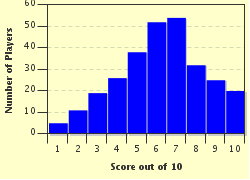Quiz Answer Key and Fun Facts
1. In this sequel, we learn that the entire first novel was itself a frame story of a frame story of a frame story of a story about some guy named Lockwood, told by an English landlord renting rooms out on the Moors to unsuspecting guests. The plot thickens, however, when the landlord is forced to recant his tales for fear that ghosts will creep into unsuspecting visitors' windows at night.
What sequel could this be?
2. This sequel to an 1880 novel is a parable about Jesus Christ, who is tempted by the Devil into murdering his father Joseph so that he can marry the woman he loves. Except it wasn't Jesus responsible--no, it was his epileptic sibling, whom nobody suspects of the crime, even though he's really, really obviously a villain, and even confesses the crime several times over.
What fictional, immense Russian novel could this be?
3. This novel follows a minor character who, having recovered his tennis shoes and ready to step away from a life of party piano-playing, moves away from West Egg to get into the bond business. His life in the Valley of the Ashes comes to an abrupt halt, though, when he finds out that his wife has been cheating on him, not that he really cares at all.
What novel could this possibly be?
4. In this sequel to an existential classic, all the inhabitants of Oran are left mute after they realize that there's no meaning to their lives, anyways, so why bother to talk? A lone doctor tries to combat the feelings of ennui and despair in a town ravaged by 20th century philosophy.
What's the book?
5. In this novel, told entirely in slang to a counselor, a high school preppie explains that it's not his fault that he's pimply and eats his fingernails. It's not fair that he has to live next door to a junkie who's obsessed with the word phony! This smash hit of the year 1952 controversially introduced the word "Stradlating" into the English lexicon.
Pray tell, what fictional follow-up to a classic bildrungsroman could it be?
6. Shakespeare wrote sequels to a few of his histories, but surely you're familiar with this sequel to a famous tragedy! In it, we learn that Birnham Wood was actually full of Ents, who do walk to Dunsinane Castle and lay siege to it. Luckily, our hero is not afraid to get blood on his hands, and calling on the support of some witches, is able to put down the threat.
What's the play?
7. This 1951 novel chronicles the rebellion of the Junior Anti-Sex League, who ignite rebellion with a series of encoded messages in a Newspeak dictionary. They are aided in the unlikeliest of places by Eastasian and Eurasian allies, and by Big Sister, who is attempting to redress a wrong done by the rest of her family. Does the rebellion succeed? The novel's ending is deliberately ambiguous.
What novel could this possibly be?
8. In this sequel, even more exciting than the original, our heroes are faced with an even bigger challenge. Infuriated by the death of their leader, Quincey, a group of Americans come to London to seek revenge. Deprived of resources, and completely out of garlic, this book's protagonist turns to the one expert in 19th century America for dealing with the threat: Abraham Lincoln.
What's the horror sequel?
9. In this sequel to a play, we get a return to stage of Lucky and Pozzo, but this time, Lucky has evolved into an advanced life-form and Pozzo is turning into a patch of green goo. Our protagonists nearly manage to tie their shoes, and, at one point, it even starts raining for a little while! But then it stops, thank goodness.
What 20th-century masterpiece is this sequel?
10. In this 18th century sequel, we find out that, in fact, nobody from the first book died at all! Cunegonde's brother comes back to life, and, after a long speech praising Newton's fluxions and denigrating the accomplishments of a German contemporary, proves that the world really is just the best place ever. Then, everybody who perished in the auto-da-fé from the first book comes together to sing about how great the world is. Finally, the protagonist fights in a war and comes out of it thinking about how war is necessary in a world as great as this one.
Dripping with sarcasm, this book was never written, but if it did exist, what would be the title?
Source: Author
adams627
This quiz was reviewed by FunTrivia editor
looney_tunes before going online.
Any errors found in FunTrivia content are routinely corrected through our feedback system.

